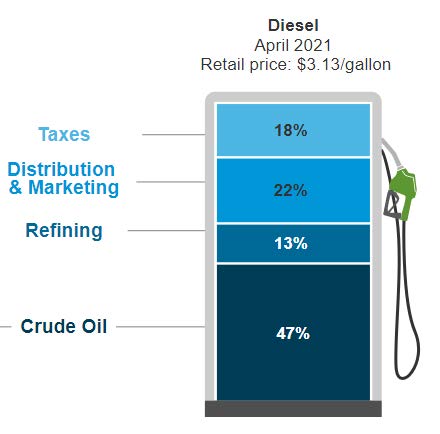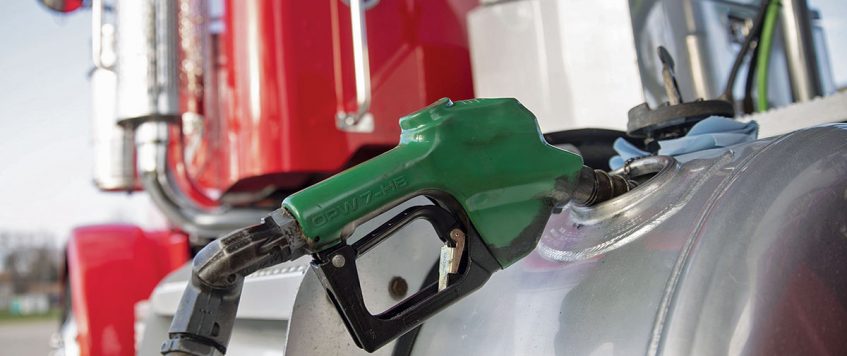-
14
Jul
WHAT MAKES UP THE PRICE OF A GALLON OF DIESEL?
We, as transportation professionals, are directly impacted by diesel fuel prices. If you are a carrier, fuel costs make up your second largest expense category, as reported in 2019.* If you are a shipper, fuel surcharges account for an estimated 17 to 22% of your total freight costs. Since diesel is such a large part of our cost of doing business it is important to understand what attributes to the price of a gallon of diesel fuel. When a consumer purchases a gallon of diesel fuel that retail price is based on the cost and profits for production and delivery through the fuel pump. The U.S. Energy Information Administration (“EIA”) says the retail price of a gallon of diesel has four main categories. The cost of crude oil, the cost and profit margin to refine the fuel, distribution, marketing (including markup by the fuel station), and taxes.
Crude oil represents the largest component of the cost of a gallon of diesel fuel, about 47% calculated April 2021. The price of crude oil, like any commodity, is impacted by supply and demand. We often see oil supplies constrained by weather, equipment failures, and even conflict between nations. Any of these and a host of other factors can reduce supply and rapidly raise prices. The demand for crude oil has been trending higher since the mid 1980’s, with the exception of 2020. Most experts agree the demand for crude oil should return to pre-pandemic levels in the second half of 2022. Crude oil prices can be volatile with swings in supply and demand and that certainly drives the price of diesel.
The costs associated with refining crude oil to produce diesel fuel accounts for about 13% of the total cost per gallon. The process of refining crude oil is very sophisticated and requires equipment that can move it through heat that captures liquid and vapors based on increasing boiling points. Refining facilities must be able to receive and store raw material, then process it, and store and ship finished products. These facilities operate 24/7 and can occupy as much space as several hundred football fields. These large facilities and their operating costs contribute significantly to the price of a gallon of diesel.
Distribution and marketing makes up about 22% of the cost of a gallon of diesel fuel. The fuel delivery industry has been impacted by the driver shortage, as we all have. Trucks, pipelines, railcars, and ships transport fuel but trucks move the majority of this product from refiners to distribution points. Marketing fuel to customers includes the labor, utilities, and equipment used for the promoting and selling of products.
Getting diesel fuel to truck stops and fueling points plus the operational costs of those facilities comprise a significant portion of distribution and marketing costs.
Taxes make up about 18% of the cost of a gallon of diesel fuel. Federal taxes are 24.4 cents per gallon on diesel as of January 1, 2021. States have varying tax amounts ranging from 8.95 cents to 74.1 cents per gallon, using 2020 numbers (https://igentax.com/gas-tax-state/). Federal taxes support the Highway Trust Fund, which in turn is responsible for federal spending on highway and mass transit. Federal funds are normally allocated to the states and combined with state fuel taxes to build and repair our roads. Tax on diesel fuel will total an estimated $10.5 billion in 2020, per the Congressional Budget Office.
Diesel prices account for a significant portion of the overall cost for any of us moving goods via truck. The better we understand what comprises the cost of a gallon of diesel the better we can explain this volatile portion of our expenses. There are a number of resources available to help learn about and monitor fuel price. The EIA is a terrific resource and can be a great tool to keep us informed concerning changes in diesel fuel
prices. (https://www.eia.gov/petroleum/gasdiesel/).

